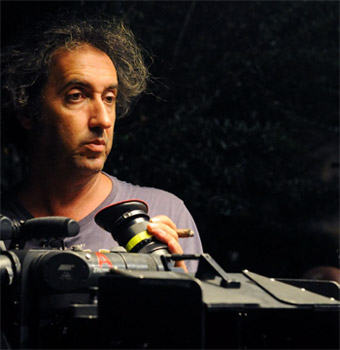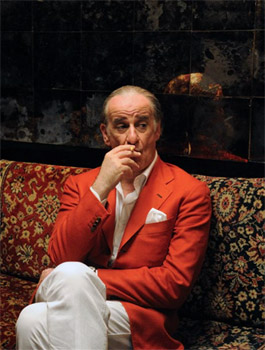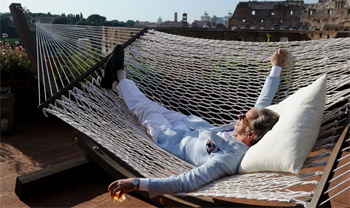Paolo Sorrentino The Great Beauty Interview

Paolo Sorrentino The Great Beauty Interview
Cast: Toni Servillo, Carlo Verdone, Sabrina Ferilli
Director: Paolo Sorrentino
Genre: Comedy, Drama
Rated: MA
Running Time: 142 minutes
Synopsis: Rome, in the splendor of summer. Tourists flock to the Janiculum Hill: a Japanese man collapses, felled by such beauty. Jep Gambardella – a handsome man with irresistible charm, despite the first signs of ageing – enjoys the city's social life to the full. He attends chic dinners and parties, where his sparkling wit and pleasant company are always welcome. A successful journalist and inveterate seducer, in his youth he wrote a novel which earned him a literary award and a reputation as a frustrated writer. He masks his disenchantment behind a cynical attitude, which makes him view the world with bitter lucidity. On the terrace of his Rome apartment which overlooks the Coliseum, he hosts parties where 'the human apparatus" – that was the title of his novel – is stripped bare, and where the comedy of nothingness is played out. Weary of his lifestyle, Jep sometimes dreams of taking up his pen again, haunted by memories of a youthful love which he still hangs on to. But will he ever manage it? Can he overcome this profound disgust for himself and others, in a city whose dazzling beauty sometimes leads to paralysis?
The Great Beauty
Release Date: January 23rd, 2014
Interview with Paolo Sorrentino
Question: How did you come to make a film that delves so deeply into the undergrowth of Rome, after the experience of making films in Ireland and the United States?
Paolo Sorrentino: I have long been thinking about a film which probes the contradictions, the beauties, the scenes I have witnessed and the people I've met in Rome. It's a wonderful city, soothing yet at the same time full of hidden dangers. By dangers, I mean intellectual adventures which lead nowhere. Initially, it was an ambitious project without limits, which I kept putting off until I found the binding element that could bring this whole Roman universe to life. And that element was the character of Jep Gambardella who was the last piece of the puzzle, and who made the whole concept of the film possible and less confused. I thought the moment had come for me to bring this undeniably ambitious film to life. After two wonderful years of travelling between Europe and the United States to make This Must Be The Place, I really felt the need to stop moving. I wanted to maintain my idle lifestyle with a job that allowed me to go home every evening; but in reality, La Grande Bellezza was an exhausting film, despite being a passionate experience.
Question: What part did Umberto Contarello play in writing the script?
Paolo Sorrentino: I've known Umberto since my youth, when I wanted to be a screenwriter and he was already an acknowledged writer for the cinema. Along with Antonio Capuano, he initiated me into the job. He introduced me to poetic worlds that I was fortunate to be able to recreate later in a personal way, according to my own sensitivity. As a result, we share a way of approaching things which now goes back more than 20 years. Our way of working is quite straightforward. It consists of chatting regularly – sometimes quite fleetingly, sometimes in more depth, depending on the ideas that daily life provides us with. Even little things, or the irrepressible need to tell each other a joke that made one of us laugh, might prompt us to write or to call up or see each other. Then, when the writing process begins, we go our separate ways. Like a long game of ping-pong, we send the script back and forward between us. I write the first version, I send it to him; he writes the second version; I do a third, and so on until the shoot, because a script can always be improved. The word 'end" doesn't exist in writing.
 Question: In terms of the staging, this film seems less baroque than your previous ones.
Question: In terms of the staging, this film seems less baroque than your previous ones.
Paolo Sorrentino: Probably. On the face of it, it's a film that's overflowing. During the preparation phase, I noticed the visual overload produced by the work on the sets, the costumes, and the great multitude of actors required for the narrative. When I turned to directing the film, I decided to keep a little distance from this. I thought the direction should merely accompany this density.
Question: In certain aspects, the film could be called 'Sorrentino Roma". Was the idea of borrowing La Dolce Vita's approach one of the starting points of the film? As with Fellini's film, the protagonist is essentially an observer.
Paolo Sorrentino: In reality, even in The Consequences Of Love and This Must Be The Place I used the narrative structure which suits me best. The protagonist of the film is above all an observer of the outside world who becomes the main 'raison d'être" of the film. Then, through a series of twists, incidentally and often for reasons linked to fate, he also undergoes a personal journey. For La Grande Bellezza, I couldn't do anything else, because the core of the film was a huge mass of interlocked facts, characters and anecdotes, all gravitating around Rome and which I wanted to transform into a film. Of course, Roma and La Dolce Vita are works that you cannot pretend to ignore when you take on a film like the one I wanted to make. They are two masterpieces, and the golden rule is that masterpieces should be watched but not imitated. I tried to stick to that. But it's also true that masterpieces transform the way we feel and perceive things. They condition us, despite ourselves. So I can't deny that those films are indelibly stamped on me and may have guided my film. I just hope they guided me in the right direction.
Question: The fact that the protagonist, played by Toni Servillo, is older than Marcello Mastroianni changes the nature of the story: there is greater disillusionment in his rapport with creativity.
Paolo Sorrentino: A writer is constantly preoccupied with the idea of having to capitalise on his own biography on an artistic level. If that biography – as in the case of Jep Gambardella – is permanently drifting on the superficiality of high society, on futile chattering that is no more than background noise, on gossip reduced to instinctive pettiness, then that capitalisation seems impossible. That's why he continually quotes Flaubert. Meanwhile, the years are rolling by for Gambardella and his greatest source of despair is the consequences of ageing. There's always less time, less energy, and happiness seems lost, or never to have existed. Pleasure has been reduced to a mechanism, which contradicts by its nature the principle of pleasure. All he has left is the rapport with the nostalgia of innocence that this character perhaps associates with an instantaneous form of something else, something very distant from his own experience: beatitude. An enviable state which, in a totally unexpected way, given his lifestyle, moves by channels of suspension and silence. That's why his encounter with the nun who devotes her life to poverty, and who is in a way close to beatitude, starts out following the usual path of a casual and irreverent social encounter. Then in the end, through her simplicity, she leads him elsewhere. Not somewhere capable of really making him change, but she at least helps him to glimpse the starting point of fresh artistic creation.
Question: Is the presence of a cardinal who only thinks about trying out culinary recipes a critique of the Church?
Paolo Sorrentino: It is rather a critique of the propagation of the culture of food, of gastronomic cuisine, and so on. Sometimes it seems we can't talk about anything else. I find the subject amusing too, the tyrannical arrogance of some who want to impose these themes everywhere is starting to annoy me. That's why – partly in jest – I wanted to show how this trend has spread even to the most unexpected places, to those dedicated to spirituality.
Question: Luca Bigazzi's splendid color photography forms an echo of the black-and-white work of Otello Martelli.
Paolo Sorrentino: My relationship with Bigazzi is now long-standing and established. I have total trust in him and we are fortunate to understand each other without speaking. So I give Luca the script and I let him interpret it and work it out in terms of lighting. He knows I'd rather go down new, unexplored paths than to rely on what we know and what we've already done, and so I think he works accordingly. I'm increasingly satisfied with this method and I'm always happy to discover the lighting he has created, rather than giving him guidance in advance.
Question: In the film, there are many allusions to Flaubert and the feeling of nothingness.
Paolo Sorrentino: The great writer and director Mario Soldati used to say that Rome, for obvious reasons, was the capital which more than any other could communicate a feeling of the eternal. But, he would add, what is a feeling of the eternal if not the feeling of nothingness?
Question: La Grande Bellezza reminds us Ettore Scola's La Terrazza, with its endless chit-chat on the writer's terrace.
Paolo Sorrentino: Yes, the exhibition of prattling, the recourse to the lowest form of scuttlebutt, the proverbial ability to demonstrate meanness even towards one's close friends, the disenchantment and cynicism that is currency amongst the Roman bourgeoisie – all of this borrows undeniably from Scola's universe. That's why I wanted to show him my film, and I was moved to see that he was deeply touched. At the end of the screening, he stroked my face for a long time, repeating how much he'd liked the film. And myself, after many years, I was moved to feel again a feeling that I had completely forgotten: to feel like a son.
Question: It seems that the film makes some nods to other filmmakers, without going so far as quoting.
Paolo Sorrentino: Effectively, in my view it's not a film which employs quotation in the strict sense, but it's a film that is totally indebted to the great Italian cinema of Scola, Fellini, Ferreri, Monicelli, etc.
Question: Original music and repertory music sit alongside one another in the film. How do they co-exist?
 Paolo Sorrentino: In thinking about this film – an inevitable mix of the sacred and the profane, just as Rome famously is – I immediately The shadow of Fellini floats over Sorrentino's homage to the splendidly indifferent city of La Dolce Vita. Thought that this flagrant contradiction of the city, its capacity to miraculously combine sacred and profane, should be echoed in the music. So from the start, the idea came to me of using sacred music and Italian popular music. In that sense, it was necessary to fall back on repertory music.
Paolo Sorrentino: In thinking about this film – an inevitable mix of the sacred and the profane, just as Rome famously is – I immediately The shadow of Fellini floats over Sorrentino's homage to the splendidly indifferent city of La Dolce Vita. Thought that this flagrant contradiction of the city, its capacity to miraculously combine sacred and profane, should be echoed in the music. So from the start, the idea came to me of using sacred music and Italian popular music. In that sense, it was necessary to fall back on repertory music.
Question: The film features many very well-known actors in Italy, notably Toni Servillo, with whom you have made four films, but also Carlo Verdone, Sabrina Ferilli, Isabella Ferrari, Iaia Forte, Serena Grandi, Dario Cantarelli, Roberto Herlitzka, and even a small role for Giulio Brogi.
Paolo Sorrentino: Whatever you say about it, Italy has an extraordinary pool of actors of every sort. They are all very different, from many different backgrounds, but all with often under-exploited potential, all just waiting to find good characters. From that point of view, I had great pleasure in calling on actors with whom I had already worked, and other very popular actors, like Carlo Verdone and Sabrina Ferilli, who usually play other types of roles. But I was sure – and this was confirmed during the shoot – that a good actor can do anything. Due to the considerable number of characters, I also had the possibility of working with actors with whom I had wanted to work for a long time, but who I had not been able to use in my previous films, like for example Dario Cantarelli, Roberto Herlitzka, Iaia Forte and Giulio Brogi. I've always loved Brogi and it was with great regret, for reasons solely due to the pace of the film, that I had to sacrifice the very long scene in which he was the main character. Toni Servillo is really a separate case. He's the actor I can ask anything of, because he is capable of doing absolutely everything. I can now move forward with him with my eyes closed, not only as far as work goes, but also in terms of our friendship, a friendship which over time becomes more joyful, lighter yet deeper at the same time.
Question: The film opens with a quote from Céline. By evoking that writer, you allude to a conception of life seen as a journey from birth to death.
The Great Beauty
Release Date: January 23rd, 2014
MORE
- Mission: Impossible Fallout
- Glenn Close The Wife
- Allison Chhorn Stanley's Mouth Interview
- Benicio Del Toro Sicario: Day of the Soldado
- Dame Judi Dench Tea With The Dames
- Sandra Bullock Ocean's 8
- Chris Pratt Jurassic World: Fallen Kingdom
- Claudia Sangiorgi Dalimore and Michelle Grace...
- Rachel McAdams Disobedience Interview
- Sebastián Lelio and Alessandro Nivola...
- Perri Cummings Trench Interview



